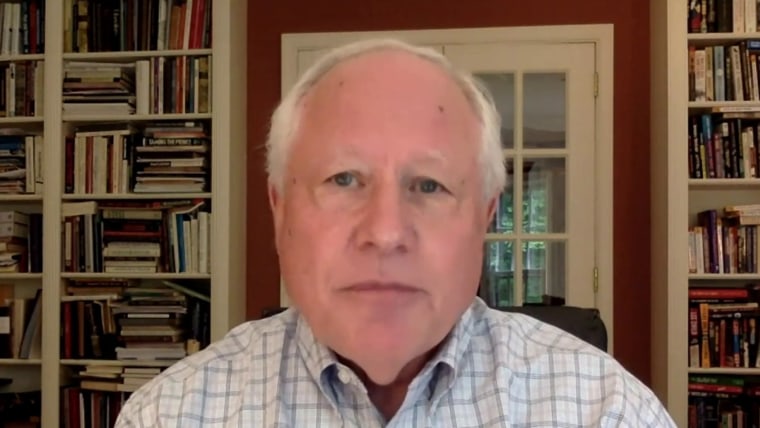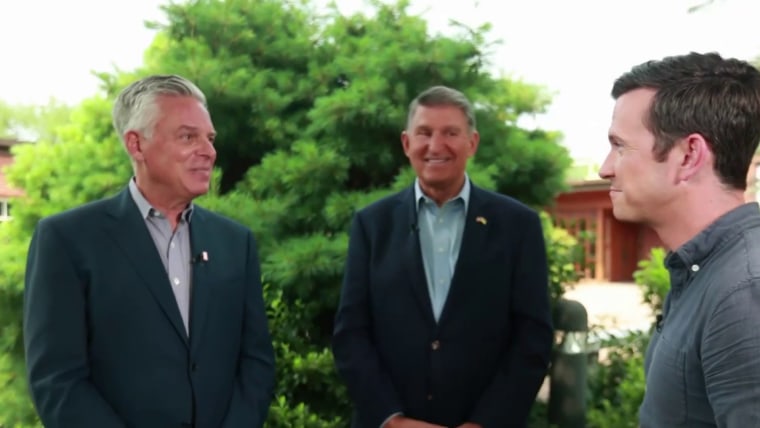On Monday, the centrist group No Labels went further than it’s ever gone in signaling interest in running a third-party unity ticket for the White House in 2024. But the way the group explained if, when and why it would run a candidate only reaffirmed that No Labels seems to have no idea what it’s doing.
The group sparked buzz by hosting an event at Saint Anselm’s College in New Hampshire on Monday, headlined by Sen. Joe Manchin, D-W.Va., and former Gov. Jon Huntsman, R-Utah. Manchin, who spoke in grandiose tones, said, “I’m here trying to basically save the nation,” and he implied an openness to running as a No Labels candidate. “I just want people to know I haven’t made a decision on what I’m going to do in 2024,” Manchin said. “This is not about me or anybody else. It’s about two parties that have gone to their respective side, the extreme right and extreme left, and the middle has been left behind. There’s no voice for the middle.”
While a significant chunk of Americans identify as independents, most don’t.
In the way it floated a potential entry into the race, No Labels also took a more aggressive posture than it previously has. In June, Mark McKinnon, a former GOP strategist who co-founded the group, said that he saw No Labels as a backup option in case President Joe Biden was trailing former President Donald Trump in a rematch of 2020. “The whole idea is to save the republic from Donald Trump,” McKinnon told Politico. But on Monday the group’s co-chair, former governor of North Carolina Pat McCrory, said the group sees running candidates as an “insurance policy” against the very prospect of a Biden-Trump rematch.
“We hope we won’t have to do it, but the fact of the matter is, if by Super Tuesday, that we see the final two candidates frankly being Donald Trump or Joe Biden ... right now 60 to 70% of the American people are saying we can do better,” McCrory said. In other words, McCrory is saying that, given Biden’s and Trump’s low favorability ratings, the safe thing to do is to drop a centrist third party into the mix.
I have many questions.
The first is: Insurance policy against what? The insurance policy claim rests on the assumption that a Biden-Trump rematch represents an emergency-level disenfranchisement of real America, where everybody really prefers a candidate who falls somewhere between the two. That would be a strange way to respond to the results of a primary system which, by definition, allows millions of people to express their preferences, including voting for candidates that skew more or less moderate in both parties. The counterargument is that the primary system presents few options and favors party activists. Which: fair. But in order for the No Labels insurance policy to get traction, it would require the existence of a silent centrist majority that is itching for a ticket that tries to stand squarely between Democrats and Republicans.

There is no evidence that such a majority exists. While a significant chunk of Americans identify as independents, most don’t, and the percentage of “true independents” — that is, those who don’t reliably lean in a partisan direction in their voting — was somewhere around 10% in the last election. In the run-up to the 2020 election, Gallup found that about 88% of Americans effectively identified with one of the two major parties, and Pew found it to be 92%.
Another question: Who wants this so-called insurance policy? The policy platform for No Labels is predicated on the idea that the way to bring the country together is to force both sides to compromise a bit on their policy preferences. For example, supporting renewable energy, but allowing domestic fossil fuel production to continue, or implementing universal background checks on gun purchases. A big issue for No Labels-affiliated politicians like Manchin is bringing down the deficit, which mattered a lot to establishment Democrats and Republicans in the neoliberal era but has almost completely fallen off as a salient issue for voters of both parties. On some hot-button issues, No Labels conveniently punts the question. Take abortion, which it describes as “too important and complicated an issue to say it’s common sense to pass a law — nationally or in the states — that draws a clear line at a certain stage of pregnancy.” But it's unlikely that this would even work for the prime demographic that No Labels would hope to win over.
Pew polling has shown that the parts of the electorate that are least committed to a party have little in common with each other. They may be dissatisfied with the partisan status quo, but they have wildly divergent views on the economy, social rights and other issues that scatter them across the political spectrum. On top of that, they tend to be lower-information voters than most of the electorate, meaning that they aren't going to be nerdy policy wonks who are actively searching for an alternative. The No Labels platform isn’t a natural home for the politically homeless; it’s an odd hodgepodge of positions that functions as a kind of reverse Goldilocks — something in the middle that no substantive community of voters wants.
While polling may indicate that on an issue-by-issue basis some No Labels positions attract wide support, politics isn’t simply an amalgam of policy positions. It’s driven by power, interests and ideology, and voters are driven instinctively to parties and candidates that recognize the reality of what’s at stake when these forces clash. Polarization poses many legitimate challenges to democratic governance in America — and across the democratic world today — but the answer isn’t to just take a bunch of issues and split the difference and avoid taking a side.
One other question that I — and many others — have is this: Does No Labels have an insurance plan for its insurance plan? The group’s CEO Nancy Jacobson adamantly denies wanting to throw the election to favor Republicans — as a number of Democratic-leaning groups are concerned about, given polling suggesting that it could siphon off more Democratic voters than Republicans — and yet she hasn’t clarified exactly what her criteria would be for pulling a No Labels candidate out of the 2024 race. “We will not spoil for either side. The only reason to do this is to win,” Jacobson recently told NBC News. But given that the futility of a candidate running as part of a far-fetched, last-second third party is obvious now, one has to ask what data No Labels officials would need to see to convince them to pull their candidate out of the race. A better question, though, might be why they’re considering running a candidate at all.

